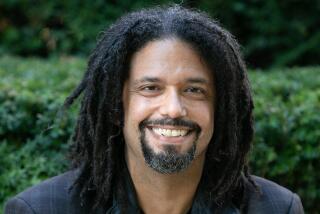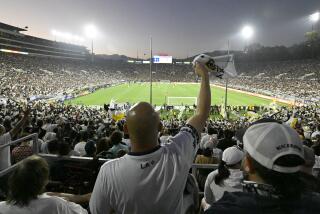WORLD CUP ’90 : Finally, There Will Be Soccer : World Cup: After billions of dollars and billions of words of buildup, play begins in a tournament that has changed lives and the course of nations.
MILAN, Italy — Convicted for his loutish behavior at an Italian League game, a fan in Genoa not only was fined but was ordered to refrain from speaking to anyone else about soccer for the entire month of the World Cup.
The Dominican monk Savonarola’s fate was hardly worse in 1498, when he was found guilty of heresy in Florence because of his anti-Renaissance tirades. He was hanged, burned at the stake and his ashes were scattered into the Arno River.
To prohibit an Italian from speaking about the World Cup now is a cruel and unusual punishment. Everyone except the unfortunate soul in Genoa is doing it, even if only to complain about the stifling traffic, the swarming tourists and the virtually incalculable cost.
But today, attention finally will be diverted to the marshy field at Giuseppe Meazza Stadium in the San Siro section of Milan, where defending champion Argentina opens the 24-team, 52-game, 12-city tournament against Cameroon before an anticipated capacity crowd of 83,000.
When the championship game is played in Rome’s renovated Olympic Stadium on July 8, Argentina expects to be there. Other contenders such as Italy, Brazil, West Germany and the Netherlands find only minimal comfort in the criticism that Argentina is a one-man team. That is like calling the Hope diamond a one-stone piece of jewelry.
Other players such as the Netherlands’ Marco Van Basten, Italy’s Gianaluca Vialli, Brazil’s Bebeto and West Germany’s Juergen Klinsmann may emerge as the sport’s reigning superstar. But it will not be easy to wrest the title from a fit and trim Diego Maradona, the elusive midfielder who led Argentina to the 1986 championship in Mexico.
Maradona is blessed, and not only with remarkable talent. An important goal in Mexico elicited protests from his English opponents that he had hit the ball with his hand. No, no, he said: “From the hand of God to the foot of Maradona.”
Cameroon also is seeking spiritual assistance. Clairvoyants in the capital of Yaounde have refused to help for less than $4,000, but they offered the Lions, as the team is known at home, one free piece of advice: Take a ritual bath before each game.
That is more practical--and also a good deal cleaner--than the United Arab Emirates’ approach. The team brought 10 camels for good luck, although the beasts so far have had none themselves. They are held up in customs.
Cameroon and the United Arab Emirates are longshots, but not the longest. That dubious distinction belongs to the United States, which qualified for the World Cup from the North and Central American and Caribbean region for the first time since 1950.
Unless it produces at least a victory and a tie in its three first-round games--Sunday in Florence against Czechoslovakia, June 14 in Rome against Italy, and June 19 in Florence against Austria--it probably will not fulfill its optimistic goal of reaching the second round. It has been suggested in the world press that the United States will be fortunate to score a goal.
“Perhaps we are further along than a lot of you think,” U.S. Coach Bob Gansler said at a press conference this week. “We’re not here as tourists.”
He did, however, take his 22 players a few days ago to the Leaning Tower of Pisa, which is located in an open area known, apropos to the U.S. mission, as the Field of Miracles.
No one will be cheering for a miracle more heartily than officials from the International Federation of Assn. Football, the sport’s governing body. They believe that any success for the U.S. team will help build momentum for the 1994 World Cup, which FIFA awarded to the United States in an effort to conquer its last frontier.
While the people of the United States remain largely indifferent to the world’s most prestigious sporting championship, Italia ’90 organizers estimate that this World Cup will be seen on television in 170 countries. An estimated 1.1 billion people will watch the championship game.
For Italy, according to the International Herald Tribune, the World Cup will generate $8 billion in revenue, including $4.4 billion in construction contracts, $1.3 billion in souvenir sales, $300 million spent by tourists, $163 million in ticket sales, $71 million in television rights fees and at least $40 million for mascot licensing rights.
But to refurbish 10 stadiums and build two others, as well as to improve rail links, subways, parking lots and highways, the Italian government spent $4.39 billion.
Because that is twice as much as originally projected, some members of Parliament, including former Italian World Cup star Gianni Rivera, have called for a government investigation. As with many problems in Italy, most people just blame the Mafia.
The cost has been high to Italy not only in lire. Twenty-four workers were killed and 600 injured in construction accidents. Most occurred at the stadiums, some of which are still obscured by scaffolding as last-minute work continues.
The stadium in Milan is completed, but the field is suspect after re-sodding. Italian League games scheduled there had to be moved after players referred to the field as a potato patch. The stadium in Rome was blessed last week by the Pope, a goalkeeper as a youth in Poland, but it has been cursed by a leaky roof.
On the up side, all spectators with legitimate tickets at the 12 stadiums will have individually numbered seats. The traditional standing-room-only terraces have been eliminated.
That was one measure taken to combat fan violence. Unfortunately for the Italian government, many of the incidents are expected to be provoked outside stadiums by so-called hooligans or lager louts. Officials in the 12 World Cup sites have been authorized to suspend the sale of alcoholic beverages 24 hours before games.
The leading exporters of hooligans are England and the Netherlands, which, perhaps not so coincidentally, were assigned to play their first-round games on the islands of Sardinia and Sicily.
England is trying to do its part. In a 10-2 victory over a Sardinian club Wednesday night, an English player, Steve McMahon, kicked a ball into the net for Sardinia and dedicated the goal to anti-hooliganism.
A security force of 42,000, including 11,000 who were trained specifically for this event, already has scored one victory.
Englishmen Paul Scarrot, who is to hooliganism what Abu Nidal is to terrorism, boasted last week that he could not be caught.
“Police are afraid of me,” he told a London newspaper, which published a picture of him standing in front of Rome’s Colosseum.
Twenty-four hours later, a drunken Scarrot, wearing a Union Jack draped around his neck, was arrested at the Rome train station and deported.
Although police may be able to curb violence in the streets and stadiums of Italy, there is virtually nothing anyone can do about the madness the World Cup is expected to inspire in other parts of the world. No other sport evokes such passion among its followers.
After Austria had eliminated West Germany in 1978, a West Berliner leaped from a window, shouting, “I don’t want to live any more.” During that game, a man in a Frankfurt restaurant tried to strangle another customer who cheered for Austria.
In 1986, a man in Colombia was so upset when his wife turned off the television during a game that he shot her. He turned the TV back on, watched the rest of the game, then called the police to turn himself in.
When Italy upset Brazil in 1982, three people in Rio de Janeiro committed suicide and five others collapsed and died of heart attacks. Also in Brazil, the economy almost collapsed in 1986, when the nation went into mourning after a loss on penalty kicks to France.
“When you win, people are happy and smiling,” said Joseph Blatter, FIFA’s general secretary. “When you lose a match, you have a breakdown in a country’s economy. It’s scary, but that’s football.”
It might be difficult for Americans to understand how a game with so little scoring could become so popular. Even FIFA would like to see more offense, threatening referees with suspensions and players with substantial fines if rules against flagrant fouls are not strictly followed.
When the game flows, there are few sports as aesthetically beautiful, with players trying to create time and space while pushing the ball toward the goal. To watch Maradona maneuver in the midfield is to watch Toscanini conduct, Baryshnikov dance and Pavarotti sing.
And the perfect complement? The beautiful country of Italy.
ADDITIONAL COVERAGE: C5
Giuseppe Meazza Stadium, Milan
Argentina, the 1986 champion, will begin first-round Group B competition in Italy by facing Cameroon here today. This showpiece stadium was selected as the site of the World Cup opening match and will also play host, with Bologna, to the Group D games.
Stadium enlargement was achieved by adding a third tier of seats supported by 11 towers that will provide access.
Four towers extend upward to provide support for the roof and space for services.
THE CITY:
Milan, with 1.51 people, is Italy’s second largest city in population but is considered the first in business and fashion.
THE STADIUM:
Giuseppe Meazza Stadium, at San Siro 3.7 miles from Milan center, received new seating, roof and a complete modernization.
Built: 1926. Capacity: 80,000. Features: Electronic scoreboard; video displays and a warmup gym.
GROUP D FIRST-ROUND MATCHES:
West Germany vs. Yugoslavia June 10, noon
West Germany vs. UAE June 15, noon
West Germany vs. Colombia June 19, 8 a.m.
Times are PDT.






